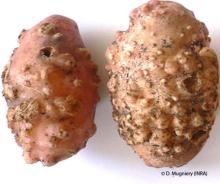Assessment and mitigation of the threat posed by root-knot nematodes to potato production in the UK

Root-knot nematodes (Meloidogyne spp.) are significant plant pests globally, capable of inflicting substantial damage on various crops. While regulated species have not been identified in Scottish soils and the most damaging species tend to establish in warm climates, recent studies highlight their rapid spread due to climate change. This project aimed to assess the threat of root-knot nematodes to Scottish potato production and to investigate resistance against Meloidogyne incognita within a germplasm collection at the James Hutton Institute.
Key findings revealed that M. chitwoodi and M. fallax could severely damage Scottish potatoes and other rotational crops, but current restrictions have prevented their introduction. Climate models indicate that, under extreme scenarios, thermophilic nematodes are unlikely to establish in Scotland outside of protected environments. Additionally, screening of wild potato relatives identified several accessions resistant to M. incognita, which could inform future breeding for resistance.
Recommendations include raising awareness of root-knot nematode symptoms among potato inspectors to enhance early detection, considering the implications of reduced nematicide use on established species like M. hapla and M. naasi, and further research on the interactions between cover crops, wildflower strips, and Root-knot nematodes species, especially as these practices become more common. Overall, maintaining vigilance and adaptive management strategies will be crucial for protecting Scottish agriculture from these emerging threats.
Image courtesy of Didier Mugniéry, INRA©
